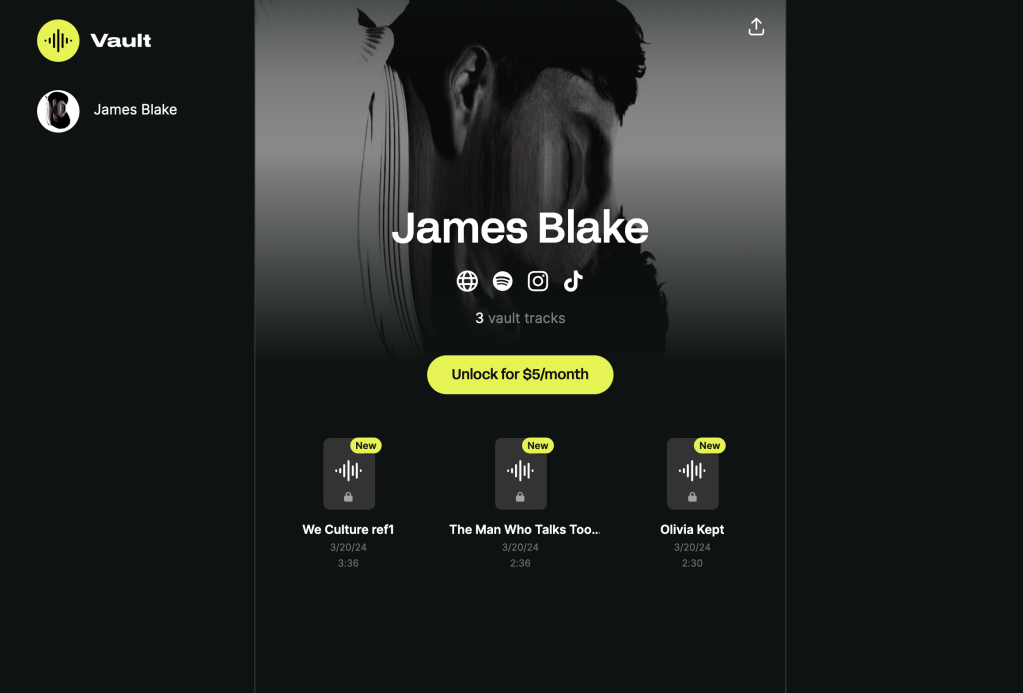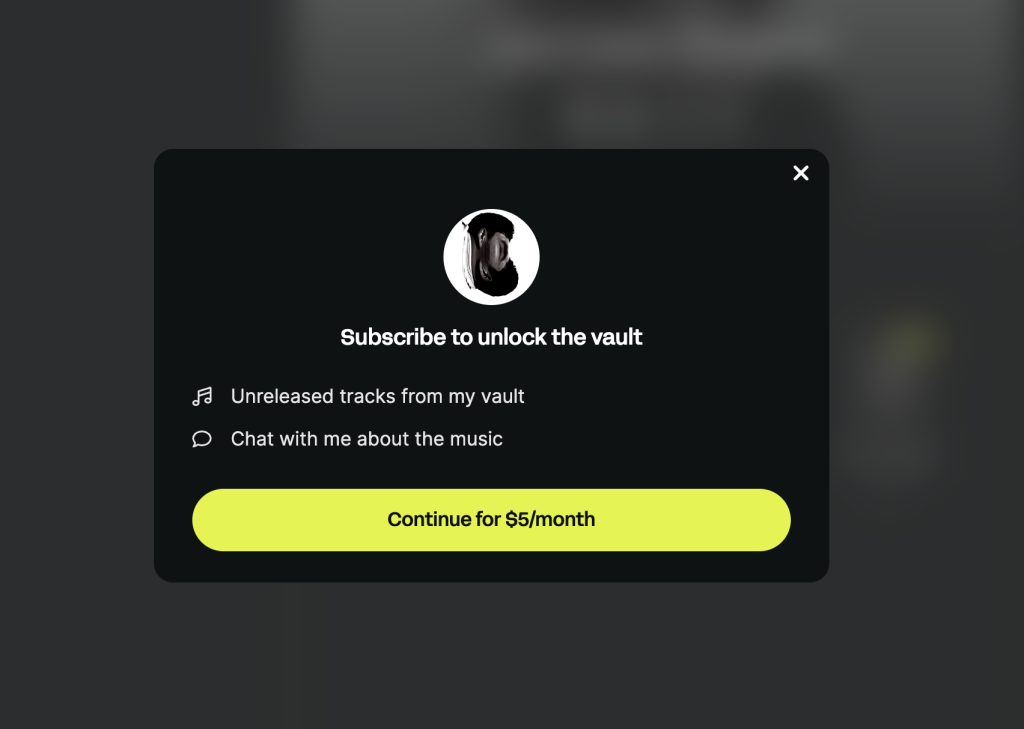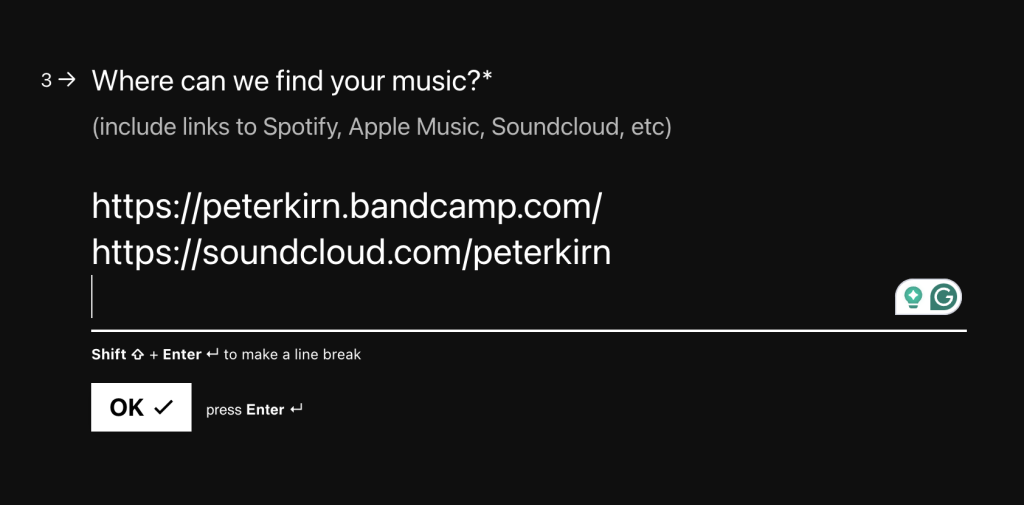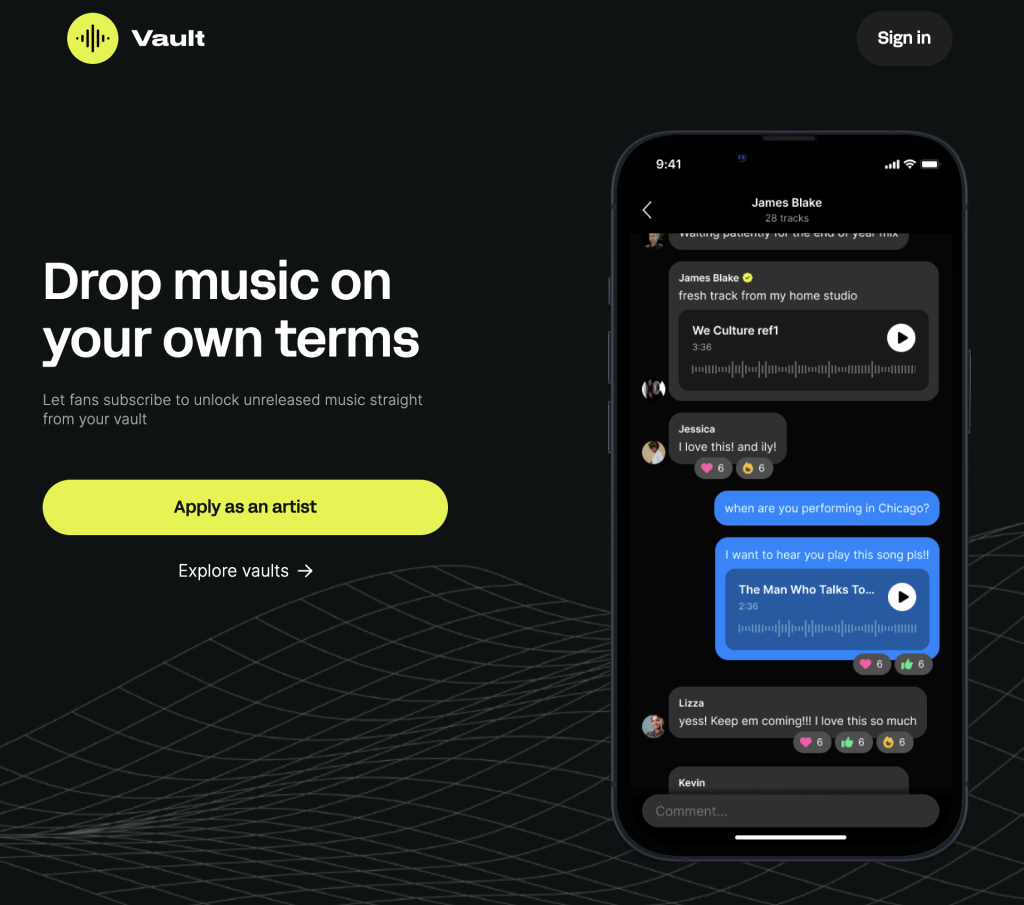Diagnosing the problem is easy – streaming is fundamentally broken and opposed to artists’ interests and no one likes it. But finding a solution? After going viral with a rant about streaming, James Blake has revealed his answer – but it’s one we’ve seen before.
This was the original viral post:
There’s a lot to unpack there – like what we mean by music (recorded music?), what we mean by free/paid (buying the recorded music?), and what we mean by brainwashing (the way value is marketed by streaming services?). Plus there’s the fact that the before/after narrative here requires that you were an artist that had access to money from the music industry in the past. But I think it’s fair to say that this is a criticism of all-you-can-eat streaming platforms, and that’s very fair.
The latest development is that Blake was contacted by Vault, yet another platform hoping to make direct-to-fan downloads a thing:
Vault is in a pre-launch state—there’s a sign-up for artists to join a waiting list—but you can go ahead and access James Blake’s page, which has three downloads so far. This isn’t James Blake’s service, per se—it’s unclear whether he has any investment stake, but he appears to be there as an artist, not a founder. But we get James Blake’s music alone in screenshots and on a usable page.
We’ve been here before
Here’s the basic interface so far. On the upside, it’s really simple – Substack-style. And that simplicity alone may make this a winner. (I’ve added myself to the testing list, and despite my gripes here, I do keep an open mind about the tech itself and I’m doing my best to try everything.)

We can already see that at its core, Vault is a subscription-based service for unreleased tracks. An artist has a page; then, to unlock it, you’re prompted for a subscription. That unlocks downloads and some kind of (currently undefined) chat. (James Blake’s page is set at $5/mo.)
There’s not so much as a music preview, though, so you have no idea what you’re getting until you pay.
The marketing for this is… ambitious:
Wait, a monthly subscription for unreleased music… with community features.
You mean like Bandcamp subscriptions, which offer subscriber-only downloads and a community page? (And some extras not seen here.)
Or there’s Patreon, of course, which offers effectively the same download features.
Or Discord, which also offers chat stuff behind a paywalled server, including music.
Which also sounds like a “hangout for fans to get exclusive music,” which is what Endlesss was doing. (I’m not sure I could identify which chat-service-with-audio was which from the screenshots, even.)
Or there’s Gumroad, which also offers downloads and a subscription service to unlock more for a monthly fee.
Or you mean like Drip.fm, a fan-oriented subscriber-only download service based on subscriptions? (Funny enough, I was with the founder when he was working on that… a decade and a half ago.) The one whose demise in 2016 prompted Cherie Hu to write this story for Forbes?
Drip.fm’s Closing And The Challenging Future Of Sustainable Creative Technologies [Forbes]
Seems like you might want to get off Twitter and read that. To be fair, here’s Sam Valenti, who started Drip, pointing out that 2024 isn’t 2016:
Don’t cry for Drip, though, it was bought by Kickstarter! You know, Kickstarter – the company that could save music! Oh yeah – speaking of, what happened to Kickstarter? Well, just last week, we learned that probably what happened was that Andreessen Horowitz thought crypto was the solution:
Here’s Fortune’s Jeff Roberts for a nice trip down memory lane, which to be extra cruel, I’ll link on AOL (erm, “Aol.”?), a company that will save mus– you know:
If you were in New York circa 2012, you’ll recall the city was having a tech moment—the Flatiron district was buzzing with VC energy while startups like Etsy, Tumblr, and Foursquare threw rooftop parties and gave out swag. This was also the era when Kickstarter, possibly the coolest of the East Coast cool kids, was on everyone’s lips. The crowdfunding platform, which launched movies like Veronica Mars and the VR headset Oculus Rift, was going to change everything about art and entrepreneurship—until it didn’t.
Today, Kickstarter is still around, but it’s about as hip as cronuts, Lena Dunham, or other artifacts from that era. So what caused the startup to lose its appeal? For the most part, the it choked on its own purer-than-thou ambitions that went side by side with a slacker work culture.
Why Kickstarter’s $100 million ‘pivot to blockchain’ didn’t pan out
Sorry I got distracted by Eurorack or something but I’m sure Etsy and Tumblr have very happy endings for creative people, and they aren’t flooded with AI or allegedly mining stuff you posted there for AI.
Anyway, I digress – we were talking about how direct-to-fan exclusives will save music or whatever. Wait… famous British electronic musicians, exclusive tracks for download… this sounds familiar. You mean a little like when Radiohead released In Rainbows in 2007 as pay-what-you-want via their blog? (And wound up selling quite a lot of vinyl of the release they gave away on digital. So they were onto something… and of course now we have an entire platform to do that on with tools like Bandcamp.)
Or… Aphex Twin, doing exactly the same thing, via SoundCloud and other tools. (Fans are also doing that – see archive.org.)
But, to be fair, while we’ve seen this idea before, we’ve never before seen the idea coming from James Blake. So, maybe you can pretend you’ve never heard these words before (or play some James Blake in the background for variety):
Imagine!
It answers this! Vault becomes like a vast electronic net, between fans and artists – a betwixtnet, let’s say. A World Wide Net. Who’s on there, apart from James Blake?
That’s incredibly exciting, or maybe it will be.
As other pitches of Vault tell us, this is like a “Substack for Music,” by which I assume they mean you go and try to click on something and it asks you for $5 a month.

I forgot Substack; Substack offers podcasts and downloads.
And there are newer takes, too, like stem.tech:
Developers and trust (or not)
Okay, skeptics – time to check your bingo cards / bets.
Knowing more about who’s behind this – and it isn’t James Blake – seems important. As music journalist Kristoffer Patrick Cornils points out on Facebook – and to me:
What James fucking Blake doesn’t tell you is that his new, super fair Patreon knock-off platform was actually built by Out The Mud Ventures, the company behind Sounds.xyz and recipient of Andreessen Horowitz money. This is a superfans-style scam and little more.
Oh yeah, remember Andreessen Horowitz? Like the “we ruined Kickstarter and destroyed all that’s good on the Internet” Andreessen Horowitz? Andreessen, as in Marc Andreessen, as in “I have a $33 million mansion and I oppose poor people moving to the neighborhood“? Yeah, that Andreessen! Cute!
Update: To be fair, that was just the seed money from Andreessen Horowitz. The $20 million A-round funding came from A.Capital ventures, whose portfolio is in fact a lot of Web3/crypto companies, but also folks like Stable.ai (the Stable Diffusion people), Notion, and AirBnb. It’s another Valley VC firm, though – for what it’s worth.
And the company in question, as listed in the terms of service – well, I’ll let their profile speak for itself:
Out The Mud Ventures, Inc. is a privately-held developer of web3-native music and economic tools powering the next generation of artists and their communities, starting with listening parties for new releases. Sound Artists can publish songs, sell NFTs, use splits, and participate in governance within a tightly integrated suite of tools. Out The Mud Ventures, Inc. was founded in 2021 by David Greenstein, Matt Masurka, and Vignesh Hirudayakanth. Out The Mud Ventures, Inc. headquarters are located in Menlo Park, California.
https://system.privco.com/company/soundxyz
Also, I want to be clear: I don’t think there’s any reason to think this will be Web3/crypto-related. James Blake has also said it’s not, and, well, you’re paying in dollars, not crypto, and there’s nowhere to connect a wallet (for better or worse). But the larger point, whether we need another VC-backed platform solution that lacks any community governance? I think that’s an open question.
When will we finally talk about independent solutions and not make the same people richer again?
Look, don’t get me wrong. (Or do get me wrong; I have now evolved into an angry troll, muttering about dialup and BBSes as I inhale vapors from my coffee maker and shout predictions about the end of the world into one of those 80s Darth Vader voice-changer toys.)
Direct-to-fan downloads were a great idea, are a great idea, and will continue to be a great idea. You make a track, you give it to someone, and they listen to it. But if you’re going to try to build a platform around that, you are marching into a haunted graveyard, a haunted graveyard full of zombies, and even the zombies have grown listless and bored. You’ve got to give us something.
It’s also telling to me that the onboarding process misses mentioning Bandcamp (under just “etc.” – to be fair, it’s a smaller service, but seems the biggest competitor in this case… and no YouTube, which is arguably a bigger competitor):

It could be that Vault succeeds based on its simplicity, building on the success of Discord and Substack, the fact that users are conditioned to those models and user experiences (and their associated subscription fees), while providing a music-oriented model. Just “doing a Substack” or Patreon with a better player is already potentially a hit. But how this site manages artist relations is everything, as Bandcamp proved. So is the question of sustainability. And don’t forget that recommendation engines (and VC funding) helped push Substack to success – and that there are still major questions about the lasting power of those platforms, too, or if they’ll die as growth slows down and investors fail to see ongoing returns.
Just “doing a Substack” or Patreon with a better player is already potentially a hit. But how this site manages artist relations is everything, as Bandcamp proved. So is the question of sustainability.
Realizing I personally grew up in the wilds of the Kentucky suburbs, I am also ready to hear about new ideas that come from people who aren’t white, male, European/American, famous artists, or all of the above. This “golden age” of music value was already deep in extracting resources from BIPOC artists. That’s an understatement – we’re talking a music industry built on daylight robbery when it isn’t grave-robbing. It has always been weighted against people from the global south – and I don’t mean that as a political statement; ask anyone outside western Europe and the USA about dealing with something as simple as Bandcamp PayPal payments.
And yeah, 100% not ****ing Andreesen Horowitz.
(It’s also worth noting: James Blake is a Universal Music Group artist. It seems likely he’d need UMG signoff to do this or else he’d be breaching contract – meaning they may also have some involvement.)

There is so much more to talk about. If you really want to be independent of platforms, then signing up for a new platform is unlikely the way to do it.
Watch this space; I’m not just here to troll. I’ve had a lot of great chats with folks doing good work on building open, self-hostable solutions for stores. We can also talk about ways to work with existing platforms that are more sustainable.
I’m not necessarily rooting against Vault. This basic model – downloadable fans where an artist at least retains some control over their page – is fundamentally one that we’ve all tended to advocate. But depending on who is involved with the platform, this isn’t direct to fan. It’s another platform. And that’s crucial to understand. Also, if you believe in the underlying basic model here – and I do – then you don’t want to see another failed platform product that mucks it up. So far, there isn’t anything here that’s new or that promises to succeed where others have failed.
After all this “streaming is brainwashing” and “avoid TikTok” nonsense, too – all with a major label and huge name backing himself – James is just taking your money and going about business as usual:
And that’s the problem. Because one thing artists don’t have is any more time and energy for platforms to waste.
Nothing to see here – not yet. It’s big artists with big labels making big talk and changing nothing – while unheard artists continue to scramble just to get people to listen at all. I hope that changes. But experience says otherwise.